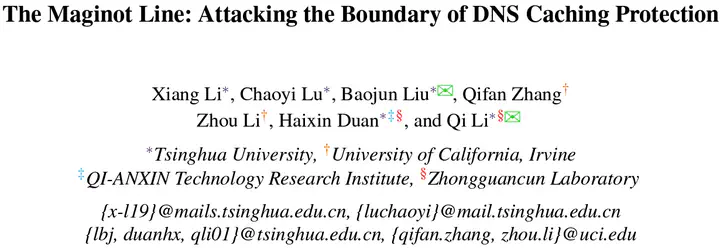The Maginot Line: Attacking the Boundary of DNS Caching Protection
Xiang Li,
Chaoyi Lu,
Baojun Liu,
Qifan Zhang,
Zhou Li,
Haixin Duan,
Qi Li
August, 2023
Abstract
In this paper, we report MaginotDNS, a powerful cache poisoning attack against DNS servers that simultaneously act as recursive resolvers and forwarders (termed as CDNS). The attack is made possible through exploiting vulnerabilities in the bailiwick checking algorithms, one of the cornerstones of DNS security since the 1990s, and affects multiple versions of popular DNS software, including BIND and Microsoft DNS. Through field tests, we find that the attack is potent, allowing attackers to take over entire DNS zones, even including Top-Level Domains (e.g., .com and .net). Through a large-scale measurement study, we also confirm the extensive usage of CDNSes in real-world networks (up to 41.8% of our probed open DNS servers) and find that at least 35.5% of all CDNSes are vulnerable to MaginotDNS. After interviews with ISPs, we show a wide range of CDNS use cases and real-world attacks. We have reported all the discovered vulnerabilities to DNS software vendors and received acknowledgments from all of them. 3 CVE-ids have been published, and 2 vendors have fixed their software. Our study brings attention to the implementation inconsistency of security checking logic in different DNS software and server modes (i.e., recursive resolvers and forwarders), and we call for standardization and agreements among software vendors.
Overview
In this paper, we report
MaginotDNS, a powerful cache poisoning attack against DNS servers that simultaneously act as recursive resolvers and forwarders (termed as
CDNS).
MaginotDNS:
https://maginotdns.net/
CVEs (9 in total)
Knot Resolver: CVE-2022-30250, CVE-2022-30251
PowerDNS Recursor: CVE-2022-30252
Simple DNS Plus: CVE-2022-30254
MaraDNS: CVE-2022-30256
Technitium: CVE-2022-30257, CVE-2022-30258
Unbound: CVE-2022-30698, CVE-2022-30699

Senior Staff Researcher
Dr. Qifan Zhang (张起帆) is now a Senior Staff Researcher of Palo Alto Networks. His research focuses on safeguarding critical internet infrastructure and addressing emerging threats in networked systems. His work centers on Network Security, with deep expertise in the Domain Name System (DNS)—the backbone of internet communication. By combining protocol analysis, fuzzing techniques, and formal methods, he designs automated tools to uncover high-risk vulnerabilities in DNS implementations and standards.
One of his flagship projects, ResolverFuzz, is a novel testing framework that exposed critical flaws in widely deployed DNS resolvers, including protocol-level security gaps (e.g., cache poisoning) and implementation errors (e.g., memory corruption). These discoveries have directly strengthened cybersecurity practices for the industry, open-source communities, and public infrastructure providers, earning recognition from organizations like CERT/CC and CVE.
Beyond DNS, he also explores the intersection of AI and Security, investigating risks in real-world machine learning deployments. My research, published in ACSAC 2022, demonstrated the first practical model extraction attacks against autonomous vehicle (AV) systems, using gradient-descent-based methods to reverse-engineer proprietary AI models. This work underscores the urgent need for robust defenses in safety-critical AI applications.
Prior to Palo Alto Networks, he earned his Ph.D. in Computer Engineering from University of California, Irvine advised by Prof. Zhou Li in 2025, and B.Eng. in Computer Science and Technology from ShanghaiTech University in 2020, complemented by a summer session at the University of California, Berkeley in 2017.
Pronunciation of his name: Chee-Fan Jang.
His Curriculum Vitae (last updated on March 14, 2025)
